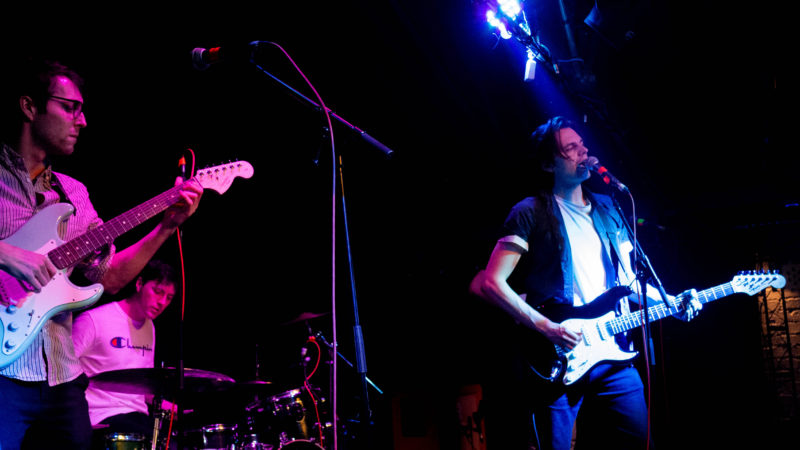The second semi-final of Trinity Ents’s annual Battle of the Bands typically sees an increase in quality across the board, to the point that a third “wild card” competitor was selected this year to proceed to the final. The judging was extremely tight and highlights the shame of the acts not being distributed evenly across the two semis – one band, Curfew, were arguably as brilliant as any of the winners and would have sailed through the first competition with no questions asked.
Ronan Connolly was landed the difficult opening slot with the room barely scraping a quarter capacity, yet he shined as if headlining a sold out Grand Social. His vocal deliveries were sodden with emotion and he perfectly balanced a combination of grit, controlled vibrato and virtuosic precision, establishing himself immediately as a serious contender. Though his guitar tone was utterly sterile, it was all Connolly needed to convey the most expressive of playing, sacrificing strict timing for impactful crescendos and showcasing a fluency in his strumming hand.
Though one of his originals utilised the progression of Daft Punk’s “Get Lucky” for its chorus, Connolly’s meandering, memorable melodies showed he was everything but unoriginal – in fact, all of his compositions outdid his one cover. This was brilliant pop music, passionate and infectious, and I don’t think there was ever a doubt in the room that Connolly would proceed to the final.
Curfew exploded onto the stage with a cover of Led Zeppelin’s “Rock and Roll” and it was immediately clear that they were not messing around. The performance was polished, yet the implementation of many welcome variations on the original in the form of added drum fills and a blistering, effect-soaked guitar solo lent the performance a pleasing rawness. After this hard-rock opener, the band eased into the more laid-back original “Mercury Veins”, full of skilful tempo accelerations, and it quickly became clear that they were not going to be matched in terms of technical prowess by any other act.
Curfew’s problem, in truth, was not a lack of talent but rather their hard-rock roots. It’s not a genre that’s overly most popular or accessible among students, and so Curfew’s elimination was likely more about genre and less about quality.
The VOIDS offered an underwhelming set, best described as adolescent. Theirs was the same indie pop sound that every transition-year band plays, the same banging of root notes on the bass, and though they did it without error, there was little enough in the way of creativity. A Catfish and the Bottlemen cover only bolstered any claims regarding The VOIDS’s lack of originality and even the relatively brooding “Sleepless Dream” failed to revive the set.
Greg Tisdall sang with a voice as suited to pop punk as it is to his Disney-style bubblegum earworms. His tracks were catchy but overblown: the frequently used three-part harmonies quickly clashed and became muddled, and vocal deliveries across the band became grating and strained at the higher end. Tisdall’s brash stage presence was at odds with the stillness of the rest of the band.
Like The VOIDS before him, Tisdall came across as adolescent, but this time via lyrical angst. A liberal use of auto-tune failed to fully convince, and often sounded discordant operating uneasily alongside some of the jazzier synths. Post Malone’s “Tell them hoes adios/ And you can drop your panties/ Leave them shits at the door”, sung enthusiastically, was rather unsettling. The band were proficient and Tisdall’s voice was impressive at times, but in the end there was just too much of a gap between the admittedly excellent “Teenagers” and Tisdall’s insistence, in semi-satirical tones, that “this is the greatest song released last year”. Tisdall makes the final nevertheless. If Curfew were hindered by their genre, Tisdall was probably trading on his.
The crowd had waned slightly by the time Étáin arrived on stage, but her performance was well worth the wait. With a delicate but excellently controlled soprano, she effortlessly transitioned from airy deliveries to strong, triumphant bellows. The crowd had by now formed a semi-circle facing the stage and interacted positively with Étáin as she delivered short anecdotes between songs. Those who stayed on were treated to acoustic and electric tunes as well as a performance as Gaeilge. With a distinct lyrical and vocal style, as well as versatile guitar playing, Étáin offered more than the average singer-songwriter and deservedly won the wildcard slot at the final.
Étáin, Greg Tisdall, Ronan Connolly, TV People and Atticus will compete in the final on March 27th in Whelan’s for the grand prize of a slot at Trinity Ball and a day of recording in a professional studio.







